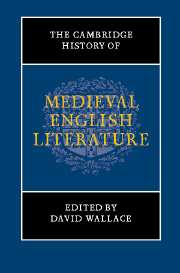Book contents
- Frontmatter
- I AFTER THE NORMAN CONQUEST
- II WRITING IN THE BRITISH ISLES
- III INSTITUTIONAL PRODUCTION
- Introduction
- 12 Monastic productions
- 13 The friars and medieval English literature
- 14 Classroom and confession
- 15 Medieval literature and law
- 16 Vox populi and the literature of 1381
- 17 Englishing the Bible, 1066–1549
- IV AFTER THE BLACK DEATH
- V BEFORE THE REFORMATION
- Chronological outline of historical events and texts in Britain, 1050–1550
- Bibliography
- Index of manuscripts
- Index
- References
17 - Englishing the Bible, 1066–1549
from III - INSTITUTIONAL PRODUCTION
Published online by Cambridge University Press: 28 March 2008
- Frontmatter
- I AFTER THE NORMAN CONQUEST
- II WRITING IN THE BRITISH ISLES
- III INSTITUTIONAL PRODUCTION
- Introduction
- 12 Monastic productions
- 13 The friars and medieval English literature
- 14 Classroom and confession
- 15 Medieval literature and law
- 16 Vox populi and the literature of 1381
- 17 Englishing the Bible, 1066–1549
- IV AFTER THE BLACK DEATH
- V BEFORE THE REFORMATION
- Chronological outline of historical events and texts in Britain, 1050–1550
- Bibliography
- Index of manuscripts
- Index
- References
Summary
Authority and experience
If the history of this period is seen as a long march towards a full vernacular Bible, it has few main events. Its beginning marks the decline of a long efflorescence of biblical translation and paraphrase in Anglo-Saxon England. The next three centuries form a record of at best sporadic and fragmentary activity, until the two versions of the Wycliffite Bible in the late fourteenth century. By 1401, in the statute De Haeretico Comburendo, the Wycliffte originators of the project are branded subversive. Any chance that their work would avoid the same fate is destroyed by Archbishop Arundel’s Constitutions of Oxford in 1407–8, which ban the making and ownership of English Bibles. There follows a century of repression, which is brought to an end by one man, William Tyndale – whose accomplishment is to produce a translation of the entire New Testament from Greek and much of the Old from Hebrew which will form the unacknowledged foundation of all subsequent authorized English translations until the twentieth century. Tyndale’s death as a heretic in 1536, by strangulation and burning at the hands of the Catholic Emperor Charles V’s agents but with the connivance of English spies, comes only one year before the reversal of English government policy on Bible translation, and foreshadows a complete authorized translation of the liturgy in Thomas Cranmer’s 1549 Prayer Book. Together, these translations complete the overthrow of the dominant value throughout the period, Latinity.
- Type
- Chapter
- Information
- The Cambridge History of Medieval English Literature , pp. 454 - 482Publisher: Cambridge University PressPrint publication year: 1999
References
- 4
- Cited by

